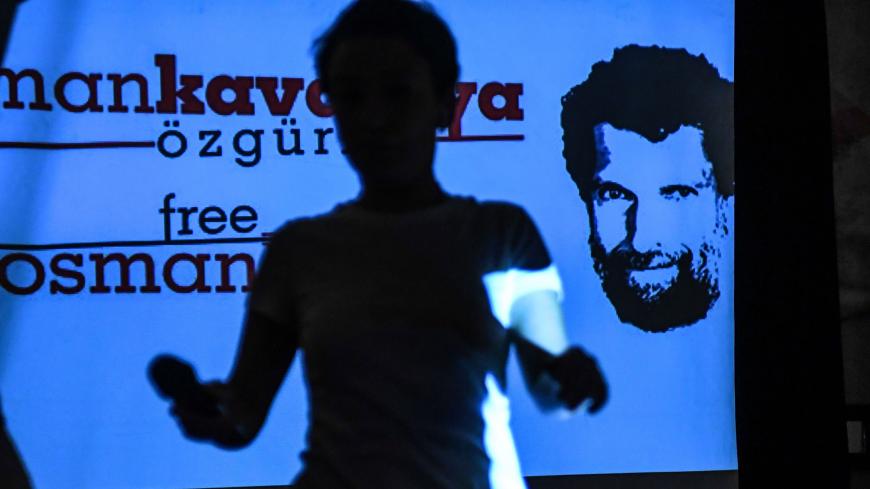« With the Grand Chamber judgment in the Osman Kavala case, Turkey (or Türkiye, as President Erdoğan has decreed “the new Turkey” should be called) has painted itself into a corner » says Robert Ellis in Ahval News.
In February 2012, then-prime minister Erdoğan declared that it was his government’s aim to raise “a pious generation,” but already a year later this project backfired. In May 2013, plans to demolish Gezi Park, a small park in Istanbul, to make way for a shopping mall were met with protests and the police intervened violently to remove demonstrators.
By September, protests, which the government characterized as an insurrection, had spread to 80 of Turkey’s 81 provinces, and 5,500 of the 3.6 million who had taken part had been arrested. The average age of demonstrators was 28, but there was wide representation: college graduates and students, environmentalists, football fans, feminists, anti-capitalist Islamists, Kurds and Alevis.
The prime minister stated this was an international conspiracy to destabilize Turkey, inspired by “the interest rate lobby”, which also included foreign media outlets such as the BBC. Erdoğan also called Twitter “a menace”, foreshadowing the present crackdown on social media.
Another consequence is that almost 60 percent of Turkey’s first-time voters say they will never vote for Erdoğan in next year’s presidential elections.
Three years after the Gezi protests, in July 2016, there was an attempted coup with the intention of toppling the AKP government. Although there has been no full enquiry, a Turkish imam resident in the United States, Fethullah Gülen, and his movement have been found responsible. Caught up in the dragnet is an American professor, Henri Barkey, and a Turkish businessman and civil rights activist, Osman Kavala, who were both in Istanbul at the time.
In the search for a culprit for the Gezi Park uprising, Erdoğan as president stated publicly in November 2018, “Someone financed terrorists in the context of the Gezi Park events. This man is now behind bars. And who is behind him? The famous Hungarian Jew G.S. [George Soros].”
And a fortnight later: “I have already disclosed the names of those behind Gezi. I said that its external pillar was G.S., and the national pillar was Kavala. Those who send money to Kavala are well known.”
In October 2017 Kavala was arrested and placed in pre-trial detention, charged with attempting to overthrow the government (Gezi Park) and attempting to overthrow the constitutional order (the failed coup). In February 2020, when an Istanbul court acquitted him of the first charge and ordered his release on bail, he was rearrested on a charge of military or political espionage.
However, in December 2019 the European Court of Human Rights found there had been several violations of the Convention and called on Turkey to secure Kavala’s immediate release.
The court also found that Kavala’s conviction pursued an ulterior purpose of reducing him to silence in his capacity as a human-rights defender and an NGO activist, which would have a dissuasive effect on the work of human-rights defenders in Turkey.
The court’s judgment was ignored, and in April this year Kavala was acquitted of military or political espionage but nevertheless sentenced to aggravated life imprisonment in connection with the Gezi Park events.
As Turkey had failed to comply with the court’s judgment, in February the Council of Europe’s Committee of Ministers referred the case to the Grand Chamber of the Human Rights Court, as it considered Turkey’s failure to execute as a refusal to execute.
On Monday the court found that Turkey had violated Article 46, §1 of the Convention because of its failure to implement the court’s ruling in December 2019.
Erdoğan, however, has stated he does not recognise European rulings and finds them “null and void”. This is strangely at odds with his declaration in January that EU membership still remains a strategic priority for Turkey. At the same time,he calls for the European Union to get rid of “strategic short-sightedness”.
By way of contrast, Meral Akşener, leader of the breakaway nationalist party, Good Party (IYIP), has criticized the life sentence imposed on Osman Kavala as “one of thousands of judicial tragedies that strike a dagger against the conscience of the community and the nation’s existence”. She has also suggested that the sentence is an act of personal revenge on the part of President Erdoğan because of Gezi Park.
Last October, Erdoğan threatened to expel 10 Western ambassadors (from the U.S.,Germany, Canada, Denmark, Finland, France, the Netherlands, New Zealand, Norway and Sweden) who called for a just and speedy resolution to Kavala’s case.
Kavala himself commented: « I think the real reason behind my continued detention is that it addresses the need of the government to keep alive the fiction that the Gezi protests were the result of a foreign conspiracy. »
In May, the European Parliament condemned Kavala’s aggravated life sentence, which was passed after more than four and a half years of unjust, unlawful and illegitimate detention and less than three months after the Committee of Ministers had launched infringement proceedings against Turkey.
In connection with the 2021 Turkey report the Parliament’s rapporteur Nacho Sánchez Amor notedthat in Turkey’s case, as opposed to other authoritarian systems, there was a more deliberate regression from a better situation.
Now the ball is in the Committee of Ministers’ court. In the light of the Grand Chamber ruling Turkey has been given until the end of September to present an action plan. The Committee will resume its examination of the case in December.
But the way the ball is rolling, it should come as no surprise that Turkey joins Russia and heads for the exit door of the Council of Europe.
Ahval News, July 15, 2022, Robert Ellis, Photo/Ozan Kose/AFP

